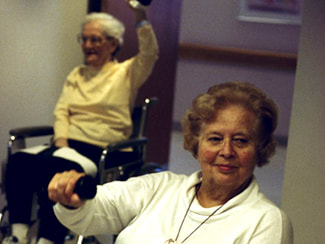One question I’ve heard repeatedly – regarding dieting is: Why do most people who lose a large amount of weight usually regain the weight? Research points to the fact that most people who diet gain the weight back. The Journal of Research in Medical Sciences, a review on dietary-related strategies, shows that “regaining nearly half of the lost weight after one year is usual, and most of dieters (re)acquire their first weight within three to five years."
This week, the UK’s The Guardian newspaper carried an article with the headline: Losing weight is a journey. But do you ever reach the end? That headline and the article made me rethink the question about weight loss and the task of keeping that weight off long-term. The diet and weight loss industry is a billion dollar business that helps people lose large amounts of weight, so why do we keep putting it all back on?
This week, the UK’s The Guardian newspaper carried an article with the headline: Losing weight is a journey. But do you ever reach the end? That headline and the article made me rethink the question about weight loss and the task of keeping that weight off long-term. The diet and weight loss industry is a billion dollar business that helps people lose large amounts of weight, so why do we keep putting it all back on?
| The problem with the question of ‘why people regain weight’ begins with the failure to see that dieting isn’t about following a specific food plan or a certain caloric intake and then just losing weight. It is about creating a new lifestyle, which in turn keeps that weight off. Long lasting behavioral changes are needed. |
When you undertake the feat of losing weight, you hopefully decide to make a commitment to healthy eating and physical fitness that will last into the future. That means you choose a lifestyle plan – healthy food, proper portions, and adequate amounts of exercise - that you will live by from today going forward, leaving behind bad eating habits and a sedentary lifestyle.
The majority of our ancestors were serfs – people who were required to work hard; that means they got a lot of exercise. They had to eat to fuel their bodies for the hard labor that they were forced to do for their survival. Many times for them, food was scarce, so the body adapted to maintain equilibrium for survival, which is the origin of the idea of the ‘thrifty gene’.
The thrifty-gene theory is that over “evolutionary time we have been exposed to regular periods of famine, during which fatter individuals would have enjoyed a selective advantage by their greater survival. Consequently, individuals with genes promoting the efficient deposition of fat during periods between famines ('thrifty genes') would be favored.” (1) These same thrifty genes may be doing us a disservice today. They may be putting out signals for our body to hold on to that extra weight or to regain the lost weight in case of future famine.
The thrifty-gene theory is probably not the whole reason though that people gain their weight back after dieting. Research points to the need for behavioral changes if long term weight loss is to be maintained. Most of us have lifestyles that include very little exercise – and most grocery stores – versus fields where our ancestors foraged for food – are filled with extremely unhealthy food. Modern food is highly processed – it is made with chemicals and high levels of sodium and sugar to ensure the shelf life of the product. A combination of our new sedentary lifestyle, the evolutionary thrifty genes and our highly processed, nutrient-poor and calorie-dense food supply is wreaking havoc with our waistlines, the scales, and our health. So what do we do to compensate? We diet!
If you know anything about processed foods, you know that most are filled with chemicals to maintain their 'shelf life,' and either there is little nutrition or they have been nutritionally enhanced or fortified. Besides processed foods there are health concerns with other areas of our food supply; for example - meat and fowl from animals fed antibiotics and bovine growth hormone; produce sprayed with toxic chemical fertilizers and farm-raised fish that been found with many types of toxins due to overcrowding and improper diet. Eating a diet mainly of processed food can contribute to all types of health problems, including high blood pressure, diabetes, overweight, and obesity. An unhealthy food supply combined with a lack of exercise and physical activity are definitely contributing factors to why people regain their weight.
Another possible answer to the question ‘why do people who take off weight when they diet and then regain the weight’ is that diets are usually very restrictive and hard to maintain, so once the weight goal is met, dieters ease up on the diet, and the weight slowly returns. These dieters have not made long-term behavioral changes in their lives. Behavioral changes are key to maintaining long-term weight loss. Besides the difficulty in making behavioral changes, most people don’t realize how important it is to identify the barriers to reaching and then maintaining a healthier way of life. Losing weight, keeping it off, and being healthier requires that you make permanent changes in your lifestyle. It may require a bit of thought and reflection to figure out what behaviors in your life need to be changed to help you maintain long term weight loss. My motto is ‘It is not a diet - it is a lifestyle’.
References
The majority of our ancestors were serfs – people who were required to work hard; that means they got a lot of exercise. They had to eat to fuel their bodies for the hard labor that they were forced to do for their survival. Many times for them, food was scarce, so the body adapted to maintain equilibrium for survival, which is the origin of the idea of the ‘thrifty gene’.
The thrifty-gene theory is that over “evolutionary time we have been exposed to regular periods of famine, during which fatter individuals would have enjoyed a selective advantage by their greater survival. Consequently, individuals with genes promoting the efficient deposition of fat during periods between famines ('thrifty genes') would be favored.” (1) These same thrifty genes may be doing us a disservice today. They may be putting out signals for our body to hold on to that extra weight or to regain the lost weight in case of future famine.
The thrifty-gene theory is probably not the whole reason though that people gain their weight back after dieting. Research points to the need for behavioral changes if long term weight loss is to be maintained. Most of us have lifestyles that include very little exercise – and most grocery stores – versus fields where our ancestors foraged for food – are filled with extremely unhealthy food. Modern food is highly processed – it is made with chemicals and high levels of sodium and sugar to ensure the shelf life of the product. A combination of our new sedentary lifestyle, the evolutionary thrifty genes and our highly processed, nutrient-poor and calorie-dense food supply is wreaking havoc with our waistlines, the scales, and our health. So what do we do to compensate? We diet!
If you know anything about processed foods, you know that most are filled with chemicals to maintain their 'shelf life,' and either there is little nutrition or they have been nutritionally enhanced or fortified. Besides processed foods there are health concerns with other areas of our food supply; for example - meat and fowl from animals fed antibiotics and bovine growth hormone; produce sprayed with toxic chemical fertilizers and farm-raised fish that been found with many types of toxins due to overcrowding and improper diet. Eating a diet mainly of processed food can contribute to all types of health problems, including high blood pressure, diabetes, overweight, and obesity. An unhealthy food supply combined with a lack of exercise and physical activity are definitely contributing factors to why people regain their weight.
Another possible answer to the question ‘why do people who take off weight when they diet and then regain the weight’ is that diets are usually very restrictive and hard to maintain, so once the weight goal is met, dieters ease up on the diet, and the weight slowly returns. These dieters have not made long-term behavioral changes in their lives. Behavioral changes are key to maintaining long-term weight loss. Besides the difficulty in making behavioral changes, most people don’t realize how important it is to identify the barriers to reaching and then maintaining a healthier way of life. Losing weight, keeping it off, and being healthier requires that you make permanent changes in your lifestyle. It may require a bit of thought and reflection to figure out what behaviors in your life need to be changed to help you maintain long term weight loss. My motto is ‘It is not a diet - it is a lifestyle’.
References
- Diab Vasc Dis Res. 2006 May;3(1):7-11.Thrifty genes for obesity and the metabolic syndrome--time to call off the search? Speakman JR1.School of Biological Sciences, University of Aberdeen, Aberdeen, Scotland, AB24 2TZ, UK. [email protected]
- https://www.ncbi.nlm.nih.gov/pmc/articles/PMC1257546/
- Am J Lifestyle Med. 2013 Nov-Dec; 7(6): 395–404. Published online 2013 Jun 14. doi: 10.1177/1559827613488867. PMCID: PMC4988401. NIHMSID: NIHMS807789 Long-Term Adherence to Health Behavior Change. Kathryn R. Middleton, M.S., M.P.H.,a,b Stephen D. Anton, Ph.D.,a,c and Michal G. Perri, Ph.D. a) Department of Clinical and Health Psychology, University of Florida, Gainesville, Florida b) Department of Psychiatry and Human Behavior, The Warren Alpert Medical School of Brown University & The Miriam Hospital, Providence, Rhode Island c) Department of Aging and Geriatric Research, University of Florida, Gainesville, Florida
Corresponding Author: Kathryn R. Middleton, Department of Psychiatry and Human Behavior, The Warren Alpert Medical School of Brown University & The Miriam Hospital, 196 Richmond St. Providence, RI 02903, Phone: (401) 793-8950, ude.nworB@notelddiM_nyrhtaK - J Res Med Sci. 2014 Mar; 19(3): 268–275. PMCID: PMC4061651. Weight loss maintenance: A review on dietary related strategies. Fatemeh Azizi Soeliman and Leila Azadbakht
Food Security Research Center, Department of Community Nutrition, School of Nutrition and Food Science, Isfahan University of Medical Sciences, Isfahan, Iran
Address for correspondence: Dr. Leila Azadbakht, Food Security Research Center, Department of Community Nutrition, School of Nutrition and Food Science, Isfahan University of Medical Sciences, P.O. Box 81745, Isfahan, Iran. E-mail: ri.ca.ium.htlh@thkabdaza






 RSS Feed
RSS Feed
